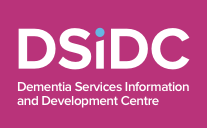GPs play a key role in the assessment, diagnosis and disclosure of dementia, since they are usually the health service professional the individual or family member first gets in contact with, when initially concerned about memory and cognitive problems. The forthcoming Irish National Dementia Strategy has identified “timely diagnosis” of dementia as a key priority in terms of policy reform and service planning. Ring-fenced funding has been set aside for the education and training of GPs in this area.

In line with recommendations set out in the Irish National Dementia Strategy about the role General Practitioners play in diagnosing and disclosing dementia the following information has been compiled to assist GPs. The section also contains helpful information about what the individual is likely to expect following a diagnosis, this additional information targets the individual with dementia and family members and provides links to documents which GPs may find useful and can be given to patients and families. The PREPARED project aims to help address one of the core objectives of Ireland’s National Dementia Strategy namely that people receive a timely diagnosis of dementia and its sub-type. Its purpose is to support GPs to assess, diagnose and help manage people with dementia in the community. It is the first major clinical education programme in Ireland designed to upskill GPs and health care professionals working in Primary Care Teams in the diagnosis and management of dementia in the community.
PREPARED Education Project – Department of General Practice – University College Cork
The Primary Care Education, Pathways and Research in Dementia (PREPARED Project) overseen by Dr Tony Foley, GP and Lecturer in the Department of General Practice UCC, is a broad clinical education initiative to upskill GPs and health care professionals working in Primary Care Teams in the diagnosis and managment of dementia in the community.
In 2016 and 2017 the PREPARED project will be involved in rolling out a number of dementia training and education initiatives including:-
- Bespoke practice based dementia workshops for GPs
- Dementia education seminars for GPs at national and local events
- Online dementia education modules for GPs (in conjunction with the ICGP)
- Clinical resources, including decision support tools, interactive guidelines, care pathways and a database of supports and services, through the www.dementiapathways.ie web resource
- Other national and local dementia training and education workshops, seminars and online initiatives for GPs and Primary Care Team clinicians
Please click here for access to the full dementia pathways resources www.dementiapathways.ie
If you would like further information about the PREPARED project and how to get involved please visit the website at https://www.ucc.ie/en/gp/research/
Guidance Documents
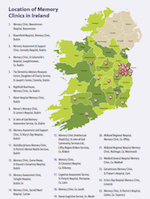 Guidelines on How to Complete Specialist e-Referral to Memory Clinics in Ireland
Guidelines on How to Complete Specialist e-Referral to Memory Clinics in Ireland
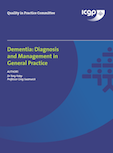 This new ICGP publication has been written by Dr Tony Foley and Professor Greg Swanwick and is titled: Dementia: Diagnosis and Management in General Practice. The reference guide provides an excellent overview and guidance for Irish GPs and covers many different topics from diagnosis to life after this. Download a copy
This new ICGP publication has been written by Dr Tony Foley and Professor Greg Swanwick and is titled: Dementia: Diagnosis and Management in General Practice. The reference guide provides an excellent overview and guidance for Irish GPs and covers many different topics from diagnosis to life after this. Download a copy
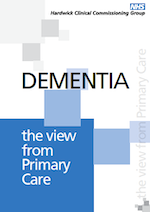 This booklet titled: Dementia: The view from Primary Care, and published by the NHS describes itself as a toolbox for GPs and practice nurses. Although written from largely a UK perspective, its content about services and supports has much relevance to GPs in Ireland.
This booklet titled: Dementia: The view from Primary Care, and published by the NHS describes itself as a toolbox for GPs and practice nurses. Although written from largely a UK perspective, its content about services and supports has much relevance to GPs in Ireland.
 “Timely diagnosis” as opposed to “early diagnosis” has become a key priority in many countries with well-developed National Dementia Strategies. Timely diagnosis is defined as the time when the patient or caregiver and the primary caregiver physician recognises that a dementia syndrome may be developing (De Lepeleire et al, 2008). This article titled: “Timely diagnosis of dementia; what does it mean? A narrative analysis of GPs’ accounts (Dhedhi et al, 2014) has been published as an open source document by the BMJ. In the article the authors argue for the importance of “timely” diagnosis as opposed to “early” diagnosis. Download a copy of Article
“Timely diagnosis” as opposed to “early diagnosis” has become a key priority in many countries with well-developed National Dementia Strategies. Timely diagnosis is defined as the time when the patient or caregiver and the primary caregiver physician recognises that a dementia syndrome may be developing (De Lepeleire et al, 2008). This article titled: “Timely diagnosis of dementia; what does it mean? A narrative analysis of GPs’ accounts (Dhedhi et al, 2014) has been published as an open source document by the BMJ. In the article the authors argue for the importance of “timely” diagnosis as opposed to “early” diagnosis. Download a copy of Article
Dementia Screening Tools for GPs
Cognitive functioning tests are tools developed to evaluate cognitive function and are important instruments for GPs in the assessment process. Several are free of charge but some of the most commonly used tools including the MMSE are now copyright restricted. In general poor performance on such tests is merely indicative of a problem with cognitive functioning (Phillips et al., 2011) In rating scores arising from using these tools, it must also be kept in mind that a person’s performance may be affected by educational ability, language, hearing, ethnicity and indeed anxiety.
While a diagnosis of dementia cannot be made solely on the basis of the results of any of these cognitive assessment tools, these tests provide useful evidence for GPs undertaking the clinical assessment and investigations.
As stated, many different tools are currently in use and choice of tool varies considerably. Clinician surveys show that the Mini-Mental State Examination (MMSE) is overwhelmingly ubiquitous in practice (Schulman Hermann & Brodaty, 2006) and is the most commonly used tool by GPs.
Mini Mental State Examination (MMSE)
The MMSE, which was developed by Folstein, measures orientation, immediate memory, attention and calculation, recall, various aspects of language and visuo-spatial skills. When used for screening, an MMSE score of less than 24 scored out of 30 is conventionally used for the detection of significant cognitive impairment (Folstein et al. 2001). However, when the intention is to classify illness, recommendations by Folstein et al are as follows:-
(i) normal cognitive function = 27-30
(ii) mild cognitive impairment = 21-26
(iii) moderate cognitive impairment = 11-20
(iv) severe cognitive impairment = 0-10
The abbreviated version of the MMSE – SMMSE is also copyright restricted.
The Montreal Cognitive Assessment (MoCA)
The MoCA test (MOCA) is a screening instrument used to detect mild cognitive impairment (CI). It was first developed to discriminate between individuals with mild CI and normal cognitive function. The MoCA test scores range between 0 to 30 points. Scores of 26 or above are considered normal. Mild cognitive impairment is a risk factor for dementia. For more information on MoCA please visit www.mocatest.org
The General Practitioner Assessment of Cognitiion (GPCog)
The General Practitioner Assessment of Cognition GPCOG is another screening tool for the assessment of cognitive impairment and has been especially designed by a group of Australian experts for use in primary care settings (i.e. general practitioners, primary care physicians and famly doctors). Some of its advantages include the fact that it is quick to use, includes an informant interview and is free of charge. Instructions for use can be found here
The Six Item Cognitive Impairment Test
The 6 Item Cognitive Impairment Test 6CIT was first developed in 1983, by regression analysis of the Blessed Information Memory Concentration Scale (BMIC). The 6CIT is a useful dementia screening tool for use in Primary Care. It was used in a large European assessment tool (Easycare) and with new computerized versions its usage is increasing. It is a brief but effective assessment tool, which is freely available
The Mini Cognitive Test (Mini-Cog)
This instrument the MINI-COG used to screen for cognitive impairment in older adults in the primary care setting. A key advantage of the instrument is that it is quick to use and takes approximately three minutes. The Mini Cog uses a three-item recall test for memory and a simply scored clock-drawing test (CDT). The latter serves as an “informative distractor”, helping to clarify scores when the memory recall score is intermediate. The Mini-Cog is freely available.
The Addenbrookes Cognitive Examination
This test, know as the ACE-111, is a relatively complex but useful cognitive screening tool. It is not as quick to administer as some tools but it effectively covers the five subdomains of Attention, Fluency, Language, Memory and Visuospatial ability. The scoring guide can be found here.
There is also an ACE-111 app called the ACE mobile. This digital version can automatically score the completed test and generate reports. More details can be found here: www.acemobile.org. The ACE-111 and the ACE mobile app are both free to download.
Challenges for GPs
In many countries where national dementia strategies have been developed, the diagnosis of straight forward cases of dementia tends to be routinely done in primary care. Rarer sub-types of dementia experienced by patients, including young onset, are usually referred by GPs to specialist services including neurology and memory clinics. If GPs are in doubt regarding a diagnosis, referrals can be made to local geriatricians , old age psychiatrists or specialist memory clinics.
Memory Clinics in Ireland
The Dementia Services Information and Development Centre has recently compiled a booklet titled: Memory Clinics in Ireland, which may be a useful resource for GPs. The booklet lists the 16 Memory Clinics now operating across the ROI and provides helpful details on staffing, service availablity and the cost of care. The Centre has also recently completed a national survey of these memory clinics. This survey has provided valuable data on the main characteristics of all of the memory clinics identified across the ROI and raises fundamental questions about the goals and outcomes of memory clinics. An article based on this survey can be downloaded here.
Post – Diagnostic Advice and Information
GPs are well positioned to offer post-diagnostic advice and information to their patients and family members to help them cope with some of the challenges dementia poses and to enable them to live well with dementia and maintain a good quality of life.
The DSIDC has published several different information booklets two of which are very pertinent to people who have recently been diagnosed. These are titled:”Coping with Early Stages of Dementia” and “Cognitive Impairment and Dementia: A Practical Guide to daily living for Family Caregivers”. Hard copies of these publications can be obtained from the DSIDC or electronic copies can be downloaded.
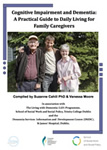 Cognitive Impairment and Dementia: A Practical Guide to daily living for Family Caregivers
Cognitive Impairment and Dementia: A Practical Guide to daily living for Family Caregivers
Many different questions concerning issues as for example, the management of one’s financial and legal affairs, the mobilization of community social supports, driving and the use of anti-dementia drugs, confront people with dementia and their family members. Accordingly other practical information kits have recently been published by the DSIDC to help families deal with these practical concerns.
GPs are well positioned to advise families about these information kits. The following links provide general advice across a range of different topics, which may be relevant to people with dementia and their family caregivers.
Information Prescriptions: These are two brief reference sheets providing practical advice on legal and financial matters along with information on community social supports.
Pills, Bills and Wills: This booklet covers medications for memory loss and lifestyle advice. The booklet also explains Enduring Power of Attorney and gives some tips around managing personal finances.
